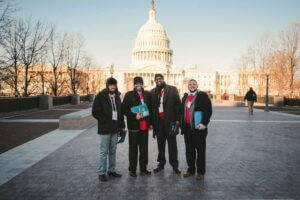LEGISLATION
MENTOR National’s legislative platform is designed to advance the mission of expanding the quality and quantity of mentoring relationships for young people, and close the “mentoring gap.” These priorities are informed by partners in the Youth Mentoring Advocacy Coalition and MENTOR’s Affiliate network.
Federal Policy
MENTOR’s Legislative Platform and Funding Priorities
Do your elected officials support the mentoring movement’s policy priorities? Check out the legislative scorecard in MENTOR’s Action Center!
Foster Youth Mentoring Act H.R. 3443
Mentoring programs that serve children with adverse childhood experiences, such as youth in foster care, require about double the resources per youth than general community-based mentorship programs. The Foster Youth Mentoring Act seeks to address the greater need for critical programs that support our country’s most vulnerable young people. The Foster Youth Mentoring Act would provide foster youth with healthy volunteer and peer mentor relationships.
- Foster Youth Mentoring Act One Summary
- Press Release: “Congresswoman Scanlon Introduces Bipartisan Bill to Expand Access to Community Mentorship Programs for Foster Youth”
Mentoring to Succeed Act S. 65/H.R. 525
School-based mentoring programs serve as an effective strategy to help students thrive in school, college, career, and life. The Mentoring to Succeed Act would help students overcome adversity, strengthen workforce preparedness, and enhance student success through capacity building and program enhancements to school-based mentoring.
- Mentoring to Succeed Act One Pager
- Press Release: “Duckworth, Durbin, Booker, Schakowsky, Garcia, Trahan Introduce Mentoring to Succeed Act”
Transition to Success Mentoring Act S.182/H.R. 653
The Transition-to-Success Mentoring Act would establish a grant program to support partnerships between school districts and community and school-based mentoring programs targeted at helping youth facing risk of dropping out before graduation. Under this legislation, participating students would develop and execute a plan for success in high school and beyond, and meet regularly with a school faculty member or volunteer mentor from the community known as a “Success Coach.”
- Transition to Success Mentoring Act One Pager
- Press Release: Booker, Carson, Menendez Introduce Bicameral Youth Mentoring Bills
Youth Workforce Readiness Act S. 434/H.R. 3416
Communities across America face significant challenges in ensuring that youth are adequately prepared to enter the workforce. The legislation establishes a competitive grant for eligible national, youth-serving, out-of-school time organizations providing programs for youth between the ages of 6 to 18. Programs will focus on four overarching pillars that support youth workforce readiness: Essential-Skill Development, Career Exposure, Employability & Certification, and Work-Based Learning, with mentoring infused throughout.
- Youth Workforce Readiness Act One Pager
- Press Release: McBath, Harder, Fitzpatrick, Chavez-DeRemer Introduce Bipartisan Youth Workforce Readiness Act
- Press Release: “U.S. Senators Tina Smith, Lindsey Graham Reintroduce Bipartisan Legislation Bipartisan Legislation to Help Prepare Young People for the Workforce”

State Policy
Coming Soon

Legislative Principles
MENTOR continues to turn research into policy through innovative new concepts for legislation to advance quality mentoring for young people. All of MENTOR’s legislative principles are grounded in elevating youth voice and diversity, equity, and inclusion.



